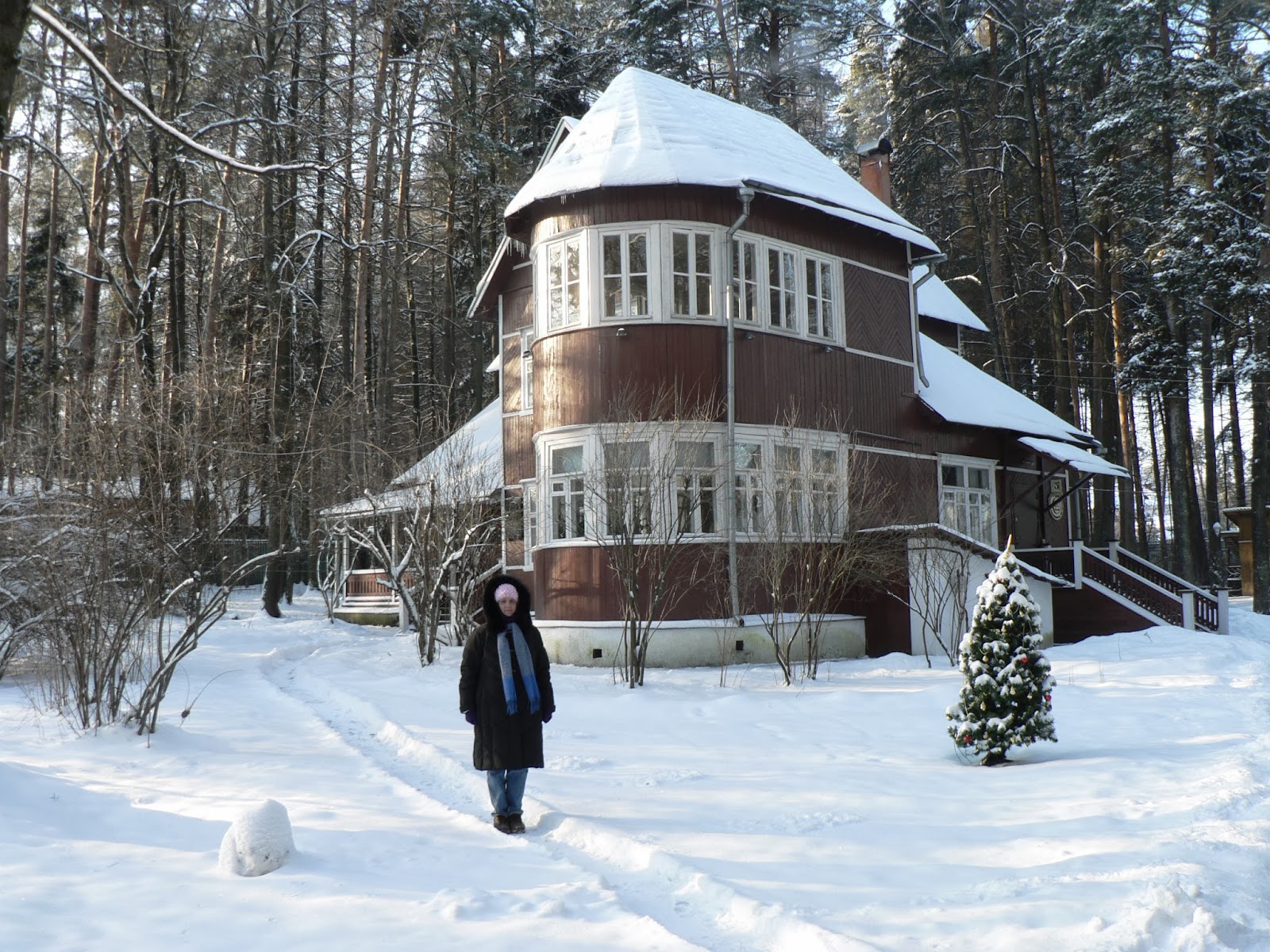The first was a dissident poet-musician of the 1970s. His house was so small that when in the late 1990s they made a museum, they built a little wooden house for the tour groups.
The kids mostly were bored by the long Russian explanations and played in the yard.
It was really cold that day. This is K's "winter coat", suitable for Siberia.
For some reason, A left the house wearing her pioneer bonnet (the yellow bonnet underneath the blue snowsuit):
This is Pasternak's house, surrounded by woods, in a village near Moscow. Look at the amazing sets of windows--it really lets in a lot of light.
This is Pasternak's desk, where he wrote his most famous novels and his most famous translations:
The other half of the upstairs room, looking out on the other part of the woods:
E on the landing:
Daddy holding A in her blue snowsuit:
While the adults listened to the very talented docent reciting Pasternak's poetry, K decided it was nap time:
The woods which remain around Pasternak's house.
The docent explained that in Pasternak's lifetime one side of the woods opened out onto a field of grain (about which she quoted more of his verses) and over the field he could see the ancient Russian orthodox village church and historic cemetery. But nowadays, some wealthy Russians bought the land and built themselves some mansions. She almost cried at the "crime" she said they committed (in ruining the grain field Pasternak immortalized in verse). But then, in general, most educated, "cultured" people do not like the super wealthy for not respecting Russian tradition. (No love lost on either side of that divide, from what we can gather, since the super wealthy have no use of all that boring old stuff.)
After this we stopped at a cafe (the only one open in this small town in winter), and all got some soup. We ordered borsch, but we got delivered some random soup. It had shredded carrots and cabbage and meat bits, like borsch does, but it didn't have a single beet, so it can't have actually been borsch. When a woman in our group asked how we liked it, and S explained the beets were missing, the woman sort of indicated her soup wasn't top notch either with the phrase "well, it can be eaten."
The third stop was the home of Kornei Chukovskii famous writer of silly stories for small children (sort of like a Russian Dr Seuss). That's a pen name derived from his real name Nikolai Vasilyevich Korneichurov. You can read more about him on Wikipedia, even in English
(http://en.wikipedia.org/wiki/Kornei_Chukovsky).
Stalin tried to have him banned (he could find conspiracies against himself anywhere) but the guy was too popular. Generations of Russians have grown up on his stories and everyone knows them, probably by heart. But he was a famous translator as well--he translated lots of children's literature.
This is Chukovskii's house:
Chukovskii used to collect all the village children in the summer and read them stories in his backyard, as the following sign commemorates.
They do summer events there now, and have a small raised platform.
For a children's author, the staff at this museum were not very hospitable. They gave the children from our group (us & one other child) a special children's tour, which involved showing them some toys people sent this famous author as gifts, and then sent us outside to play. We didn't hear anything about his life or work. Did we mention how cold it was outside? So K put on a little show for us while the adults were in the warm interior listening to the rest of his life story.
On the whole, it was an amazing trip. It was a very long day, but we were glad to see it. It was perfect winter weather--sunny, crisp, bright, and cold, even by Russian standards (--22 celsius). Maybe the kids weren't impressed with the history, but even they enjoyed the excursion. This is A on Daddy's lap as we went from one place to the next on the tour bus:
















No comments:
Post a Comment
Note: Only a member of this blog may post a comment.